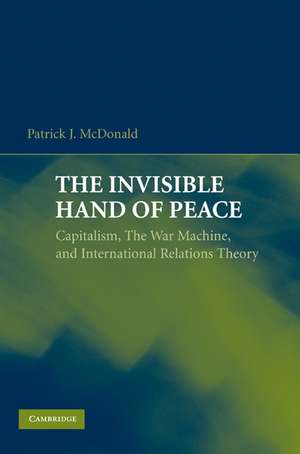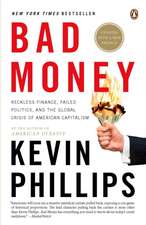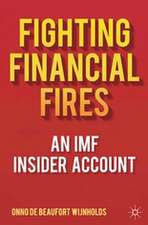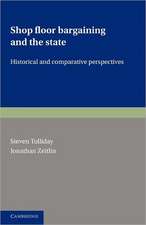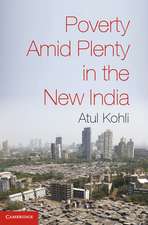The Invisible Hand of Peace: Capitalism, the War Machine, and International Relations Theory
Autor Patrick J. McDonalden Limba Engleză Paperback – mar 2009
| Toate formatele și edițiile | Preț | Express |
|---|---|---|
| Paperback (1) | 242.54 lei 6-8 săpt. | |
| Cambridge University Press – mar 2009 | 242.54 lei 6-8 săpt. | |
| Hardback (1) | 378.02 lei 6-8 săpt. | |
| Cambridge University Press – mar 2009 | 378.02 lei 6-8 săpt. |
Preț: 242.54 lei
Nou
Puncte Express: 364
Preț estimativ în valută:
46.42€ • 50.44$ • 39.02£
46.42€ • 50.44$ • 39.02£
Carte tipărită la comandă
Livrare economică 21 aprilie-05 mai
Preluare comenzi: 021 569.72.76
Specificații
ISBN-13: 9780521744126
ISBN-10: 0521744121
Pagini: 354
Ilustrații: 1 b/w illus. 17 tables
Dimensiuni: 152 x 229 x 23 mm
Greutate: 0.54 kg
Editura: Cambridge University Press
Colecția Cambridge University Press
Locul publicării:New York, United States
ISBN-10: 0521744121
Pagini: 354
Ilustrații: 1 b/w illus. 17 tables
Dimensiuni: 152 x 229 x 23 mm
Greutate: 0.54 kg
Editura: Cambridge University Press
Colecția Cambridge University Press
Locul publicării:New York, United States
Cuprins
1. American grand strategy and the liberal peace; 2. Liberal international relations theory on war; 3. Releasing the invisible hand; 4. Liberal economic institutions and peace in the twentieth century; 5. Free trade and peace in the first era of globalization; 6. From rivalry to friendship; 7. The Achilles' heel of liberal international relations theory?; 8. Peace across the Taiwan Strait?; 9. The invisible hand or the ballot box?; 10. Capitalism and America's peaceful market power.
Recenzii
'Thoroughly researched, cogently argued, and clearly written, McDonald's The Invisible Hand of Peace draws out the essential contribution that capitalism, private property, and free trade make to the liberal peace. McDonald insightfully combines political theory, quantitative analysis, and case studies in a way that illuminates both international history and contemporary policy debates.' Michael W. Doyle, Columbia University
'The liberal argument that international commerce reduces the chance of military conflict among trading partners has long been controversial among scholars and policy makers. McDonald's argument that the pacifying effect of trade depends on the presence of liberal rules governing trade within each state helps to sort out when trade helps preserve peace and when it does not. His combination of quantitative analysis and careful examination of the well-known historical cases that have fuelled the controversy over trade and conflict makes his book especially convincing.' Benjamin O. Fordham, State University of New York, Binghamton
'Patrick McDonald argues forcefully that Adam Smith's invisible hand promotes not only wealth but international peace as well. Going beyond commercial liberalism, McDonald demonstrates that private property and competitive markets constrain the political rent-seeking of leaders and make them more responsive to popular demands. Deftly using both data analysis and historical materials, he advances a challenging new domestic political economy explanation of the erroneously labeled democratic peace.' David A. Lake, University of California, San Diego
'The liberal argument that international commerce reduces the chance of military conflict among trading partners has long been controversial among scholars and policy makers. McDonald's argument that the pacifying effect of trade depends on the presence of liberal rules governing trade within each state helps to sort out when trade helps preserve peace and when it does not. His combination of quantitative analysis and careful examination of the well-known historical cases that have fuelled the controversy over trade and conflict makes his book especially convincing.' Benjamin O. Fordham, State University of New York, Binghamton
'Patrick McDonald argues forcefully that Adam Smith's invisible hand promotes not only wealth but international peace as well. Going beyond commercial liberalism, McDonald demonstrates that private property and competitive markets constrain the political rent-seeking of leaders and make them more responsive to popular demands. Deftly using both data analysis and historical materials, he advances a challenging new domestic political economy explanation of the erroneously labeled democratic peace.' David A. Lake, University of California, San Diego
Notă biografică
Descriere
This book shows that the domestic institutions associated with capitalism have promoted peace between states over the past two centuries.
